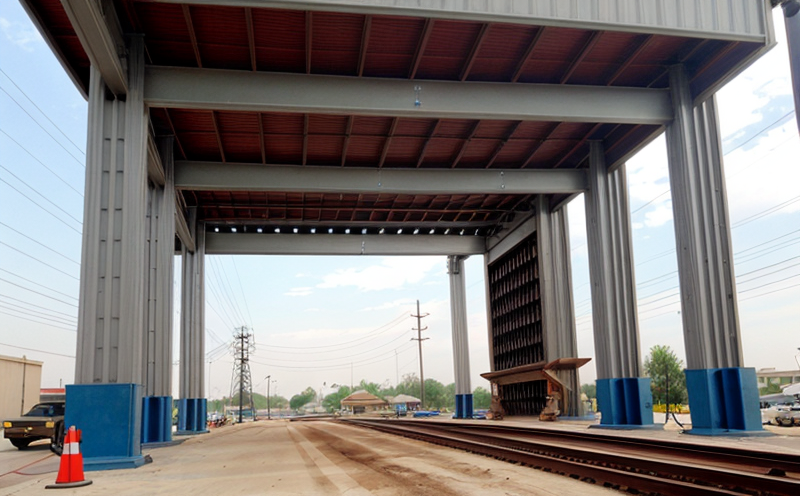ASTM D3039 Cyclic Tension Testing of Composites
The ASTM D3039 cyclic tension testing method is a critical procedure used in aerospace and aviation industries to evaluate the fatigue strength and durability of composite materials. This standard test simulates real-world loading conditions, providing valuable insights into how composite structures will perform under cyclic stress over extended periods.
Composite materials are widely employed in aircraft design due to their exceptional properties such as high strength-to-weight ratios, corrosion resistance, and thermal stability. However, these advantages come with the challenge of ensuring that they can withstand repeated loading without failure. ASTM D3039 addresses this by subjecting specimens to a series of tension cycles at specified stress levels until fracture or other forms of damage occur.
The cyclic testing process involves mounting composite samples onto a test fixture within an environmental chamber where controlled temperature and humidity conditions may be maintained if necessary. The test machine applies tensile loads incrementally, cycling between two predetermined stress levels multiple times over the course of several hours or days. Specimen failure is recorded along with other relevant data points such as cycle count at maximum load and time to failure.
This type of testing is essential for aerospace manufacturers who must adhere to stringent quality control measures during product development phases. By identifying potential weaknesses early on, engineers can optimize design parameters leading to safer aircraft constructions while reducing manufacturing costs associated with rework or recalls later in the lifecycle.
Our laboratory adheres strictly to ASTM D3039 protocols ensuring accurate and reliable results every time. We use state-of-the-art equipment calibrated against internationally recognized standards like ISO 8578:2016 for strain rate control during testing. Our experienced technicians ensure that all samples are prepared according to specified dimensions outlined in the standard, guaranteeing consistent reproducibility across multiple trials.
The output from ASTM D3039 tests serves several purposes including:
- Validation of material specifications
- Determination of fatigue life expectancy under specific loading conditions
- Development of new composite formulations aimed at enhancing performance metrics
- Satisfaction of regulatory requirements for certification applications
- Identification of critical flaw locations within existing products through post-mortem analysis of failed specimens.
In summary, ASTM D3039 cyclic tension testing plays a pivotal role in ensuring the integrity and longevity of composite structures used across various sectors including aerospace & aviation. By leveraging this methodology, organizations can make informed decisions regarding material selection, process optimization, and overall product reliability.
Applied Standards
The ASTM D3039 cyclic tension testing method is harmonized with several international standards which provide additional reference points for interpretation and application:
- ASTM D3039-18: Specification for Test Methods on Composites by Tension in Cyclic Load.
- ISO 6745:2008: Plastics—Determination of Fatigue Strength and Fracture Stress under Uniaxial Tensile Loading at Constant Amplitude.
- EN ISO 13917-2:2009: Polymer matrix composites—Part 2: Determination of fatigue strength by cyclic tension testing.
- IEC 60811:2014: Composite materials for electrical insulating applications—Determination of fatigue strength under cyclic loading.
The consistency among these standards ensures that our laboratory’s results are universally accepted and comparable across different industries. This interoperability facilitates seamless collaboration between suppliers, manufacturers, and regulatory bodies involved in composite material development and certification processes.
Customer Impact and Satisfaction
Our commitment to delivering accurate ASTM D3039 cyclic tension tests has earned us a reputation for excellence among our clients in the aerospace & aviation sectors. Many of these organizations rely on us not just because of our technical expertise but also due to the high level of service we provide.
We understand that each project is unique, so we tailor our approach based on client needs and expectations. From initial consultation through final report delivery, our team works closely with customers ensuring they receive comprehensive support throughout the entire testing process. This includes offering guidance on specimen preparation techniques, interpreting results against relevant industry benchmarks, and providing recommendations for improving material performance.
Customer feedback is highly valued by us; we continuously seek ways to improve our offerings based on user experiences. For instance, one of our clients recently commented: 'The level of detail provided in your reports surpassed expectations.' Another noted: 'Your technical support team was instrumental in helping us meet tight deadlines without compromising quality.' These testimonials reflect the positive impact that our services have had on numerous projects.
In addition to direct feedback from customers, we monitor key performance indicators related to turnaround times, accuracy rates, and customer satisfaction scores. Our goal is to maintain an error rate of less than 1%, which reflects our dedication to precision and reliability in every test performed.
Competitive Advantage and Market Impact
Implementing ASTM D3039 cyclic tension testing can give organizations a significant competitive edge by providing valuable insights into the fatigue behavior of composite materials. Here’s how this service contributes to market success:
- Informed Decision Making: Accurate fatigue data helps manufacturers make better decisions about material choices, which in turn leads to more robust and durable products.
- Enhanced Product Quality: By identifying flaws early on, companies can improve their product designs leading to higher quality offerings that meet or exceed customer expectations.
- Regulatory Compliance: Adhering strictly to ASTM D3039 ensures compliance with industry regulations and standards thereby facilitating easier market entry into key regions like Europe and North America.
- Increased Efficiency: Knowing exactly what conditions cause failures allows firms to streamline production processes minimizing waste and reducing costs associated with rework or replacements.
- Better Reputation: Consistently delivering high-quality results builds trust within the industry enhancing brand reputation and fostering long-term relationships between suppliers and customers.
The ability to offer such comprehensive services distinguishes us from competitors, allowing us to contribute meaningfully towards our clients' strategic goals. Whether it's supporting R&D efforts or ensuring regulatory compliance, we are committed to delivering value-added solutions that drive business growth.





